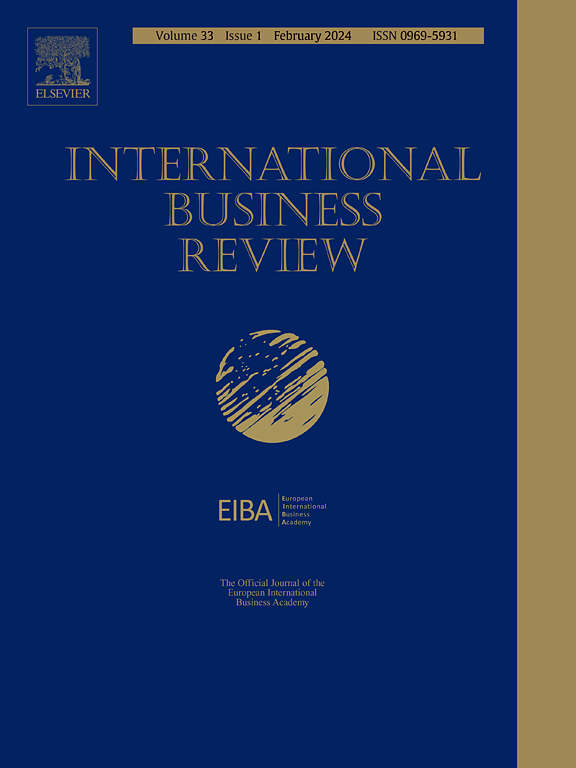海归企业家的国际经验:对创业取向和国际化速度的影响
IF 6.1
1区 管理学
Q1 BUSINESS
引用次数: 0
摘要
尽管海归企业家先前的国际经验很重要,但其概念化及其对企业成果的影响仍不清楚。我们提出了一个新的框架来理解先前的国际经验,包括三个组成部分:时间长度、文化距离和文化特殊性,以及它们之间的相互作用。我们的研究考察了海归的国际经验如何影响企业的创业取向和国际化速度。利用216家中国国际化中小企业的数据,我们发现先前的国际经验通过实证分析直接和间接地影响了国际化的速度。经验丰富的东道国与海归母国之间的文化距离,以及经验丰富的东道国与公司国际化国家之间的文化距离,调节了这些关系。与海归祖国的文化距离似乎是一种资产,而对于公司正在国际化的国家来说,这似乎是一种负担。我们讨论了国际经验概念化和海归创业的理论和管理意义。本文章由计算机程序翻译,如有差异,请以英文原文为准。
Returnee entrepreneurs’ international experience: Effects on entrepreneurial orientation and speed of internationalization
Despite the importance of returnee entrepreneurs’ prior international experience, its conceptualization and effect on firm outcomes remain unclear. We propose a new framework for understanding prior international experience, consisting of three components: length of time, cultural distance, and cultural specificity, along with their interactions. Our study examines how returnees' international experience impacts firms' entrepreneurial orientation (EO) and speed of internationalization. Using data from 216 Chinese internationalizing SMEs, we find that prior international experience positively influences the speed of internationalization, both directly and indirectly through EO. Cultural distance between the experienced host country and the returnee's home country, and that between the experienced host country and the firm’s internationalizing country, moderate these relationships. The cultural distance to the returnee’s home country seems to be an asset, whereas that to the firm’s internationalizing country seems to be a liability. We discuss theoretical and managerial implications for international experience conceptualization and returnee entrepreneurship.
求助全文
通过发布文献求助,成功后即可免费获取论文全文。
去求助
来源期刊

International Business Review
BUSINESS-
CiteScore
14.10
自引率
6.90%
发文量
95
审稿时长
62 days
期刊介绍:
The International Business Review (IBR) stands as a premier international journal within the realm of international business and proudly serves as the official publication of the European International Business Academy (EIBA). This esteemed journal publishes original and insightful papers addressing the theory and practice of international business, encompassing a broad spectrum of topics such as firms' internationalization strategies, cross-border management of operations, and comparative studies of business environments across different countries. In essence, IBR is dedicated to disseminating research that informs the international operations of firms, whether they are SMEs or large MNEs, and guides the actions of policymakers in both home and host countries. The journal warmly welcomes conceptual papers, empirical studies, and review articles, fostering contributions from various disciplines including strategy, finance, management, marketing, economics, HRM, and organizational studies. IBR embraces methodological diversity, with equal openness to papers utilizing quantitative, qualitative, or mixed-method approaches.
 求助内容:
求助内容: 应助结果提醒方式:
应助结果提醒方式:


